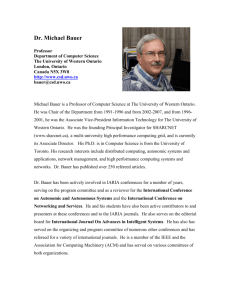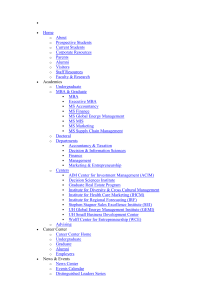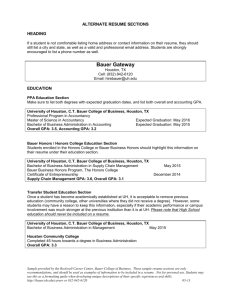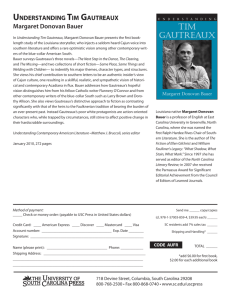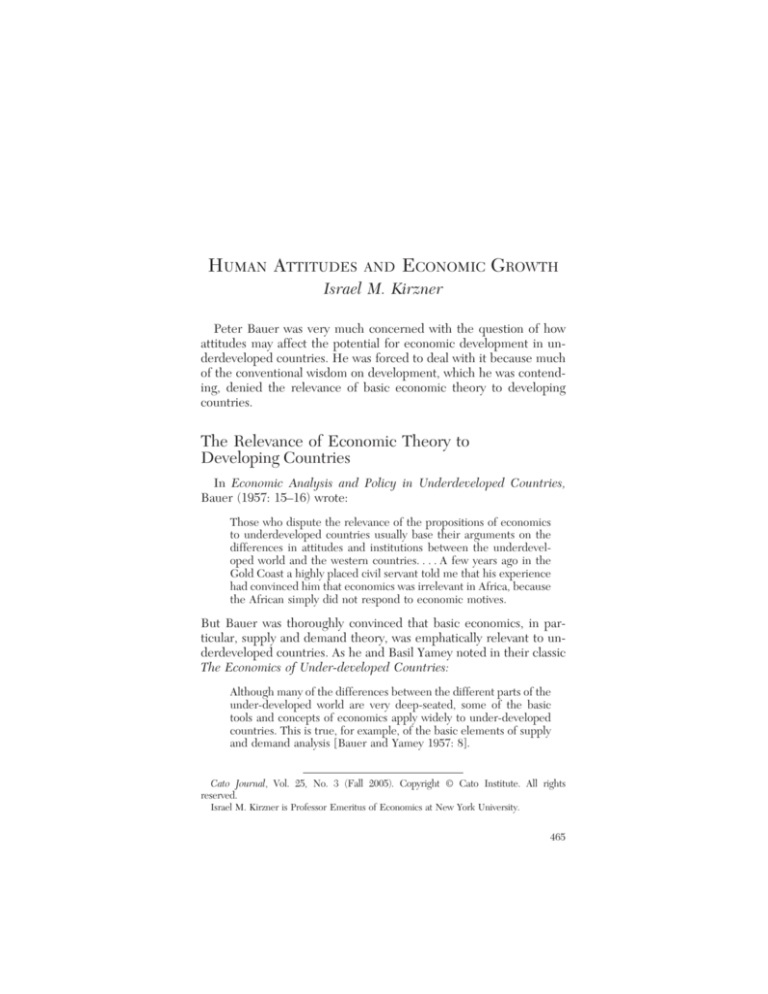
HUMAN ATTITUDES
AND
ECONOMIC GROWTH
Israel M. Kirzner
Peter Bauer was very much concerned with the question of how
attitudes may affect the potential for economic development in underdeveloped countries. He was forced to deal with it because much
of the conventional wisdom on development, which he was contending, denied the relevance of basic economic theory to developing
countries.
The Relevance of Economic Theory to
Developing Countries
In Economic Analysis and Policy in Underdeveloped Countries,
Bauer (1957: 15–16) wrote:
Those who dispute the relevance of the propositions of economics
to underdeveloped countries usually base their arguments on the
differences in attitudes and institutions between the underdeveloped world and the western countries. . . . A few years ago in the
Gold Coast a highly placed civil servant told me that his experience
had convinced him that economics was irrelevant in Africa, because
the African simply did not respond to economic motives.
But Bauer was thoroughly convinced that basic economics, in particular, supply and demand theory, was emphatically relevant to underdeveloped countries. As he and Basil Yamey noted in their classic
The Economics of Under-developed Countries:
Although many of the differences between the different parts of the
under-developed world are very deep-seated, some of the basic
tools and concepts of economics apply widely to under-developed
countries. This is true, for example, of the basic elements of supply
and demand analysis [Bauer and Yamey 1957: 8].
Cato Journal, Vol. 25, No. 3 (Fall 2005). Copyright © Cato Institute. All rights
reserved.
Israel M. Kirzner is Professor Emeritus of Economics at New York University.
465
CATO JOURNAL
Moreover, from his own extensive study and direct observation in
Asia and Africa, Bauer (1957: 15) concluded:
I am now convinced of the very wide applicability to underdeveloped countries of the basic methods and approach of economics. . . . I am thinking especially of the elements of supply and demand analysis and its simpler conclusions, the tendency of people to
seek activities and occupations which yield the highest net advantage within the opportunities open to them.
In a 1967 paper, Bauer emphasized the importance of elementary
economic principles. He criticized sophisticated economic models “in
which the abstraction and aggregation involved render them
irre1evant . . . they become travesties which divert attention from the
essentials and obscure the issues.” He pointed out that “the necessity
of emphasizing the importance of apparently trite elementary propositions is that in the last 20 years or so economists themselves have
ignored them.” Among these “elementary propositions” are those of
supply and demand theory, with particular emphasis on “supply,
demand and price as functional relationships” (Bauer [1967] 1976:
285–87).
It was for this reason that Bauer pleaded for direct observation of
conditions in developing countries. In this emphasis his point was
precisely the opposite of what many other economists who, throughout the history of economic thought have emphasized observation,
have had in mind. Throughout the history of economics, critics of
economic theory, particularly critics of supply and demand theory,
have argued that economics should be based not on theory but on
empirically established relationships. Bauer’s point was precisely the
opposite. In order to be able to apply simple economic propositions
to widely disparate real-world contexts, it is necessary to recognize the
particularities of these disparate contexts—otherwise the relevance of
these simple propositions of economic theory will be overlooked or
denied.
Bauer’s conviction of the universal relevance of supply and demand
analysis was based on his insight that despite the differences in “the
values which people cherish and thus in the objectives they wish to
attain, and in the various social and technical obstacles which circumscribe their activities”—human beings share a basically “economic”
attitude (Bauer 1957: 17–18). In the words of Lord Desai (2002: 62),
Bauer believed “that the driving force of self-interest in pursuit of
well-being is of universal application.”
I will seek to push Bauer’s approach a little further than his
recognition of the powerful, universal force of simple economic
466
HUMAN ATTITUDES
AND
ECONOMIC GROWTH
self-interest. My focus will be not so much on the insight, central to
Bauer’s position, that self-interest ensures that demand curves slope
down and that supply curves slope up, thus ensuring the relevance of
simple supply-demand analysis. Rather, my focus will be on the entrepreneurial process of dynamic market competition, upon which we
depend for our conviction that markets do indeed tend to gravitate
toward the prices and quantities marked out by the supply-demand
intersection.
Beyond Pecuniary Self-Interest
Critics of economic theory have traditionally focused their attacks
on the model of homo oeconomicus, with its emphasis on maximizing
net pecuniary gain. They believed it was this model of the economic
agent that underlies economic theory. The economists whom Bauer
cites as denying the relevance of economic theory to developing countries were arguing that the attitudes of economic agents in developing
countries were so different from the attitude of homo oeconomicus
that supply-demand analysis was no longer of relevance. Bauer was
defending this relevance by challenging the critics’ understanding of
the attitudes of economic agents in developing countries.
I will take issue with the critics’ arguments not by claiming the
universal presence of strong pecuniary self-interest, but by denying
that the crucial theorems of economics in fact depend on such pecuniary self-interest at all. Instead, I will claim, the economists’ view
of the market process and of the so-called law of supply and demand
rests on the insight that economic agents are purposeful. In this I am
following a tradition (associated with the names of Philip Wicksteed,
Lionel Robbins, and Ludwig von Mises) that does not see economic
theory as resting on the assumption of narrow selfishness, but on the
human propensity to manipulate scarce means consistently toward
the achievement of adopted goals.
In fact, I have argued that the same kind of competitive market
processes that underlie the conclusions of elementary economic
theory can be expected even in an imaginary society peopled only by
altruists. Even if each economic agent has no other goal but that of
benefiting his or her fellow citizens in some particular way, we should
expect, in a society permitting freedom for market activities, the kinds
of market activity and market phenomena with which we are familiar
in our own world, in which altruism is not the prime universal goal of
members of society (see Kirzner 1990, 2004).
In such an imaginary altruistic world one person, intent on healing
the sick, might seek to maximize his profits in manufacturing, say,
467
CATO JOURNAL
cheese, in order to support hospitals in their healing and in their
medical research. He will pay no more than market wages (and provide no more than the absolutely necessary perks and amenities) in
order to secure the labor he requires. In so doing he is not being
selfish at all, he is being altruistic toward the sick.
A second industrialist may be producing bicycles in order to feed
the hungry. He, too, will act in accordance with the profit-maximizing
theory of the firm, competing vigorously with other market participants.
More important, both the cheese manufacturer and the bicycle
manufacturer—precisely because they are the altruists that they
are—will be on the lookout for pure profit opportunities. As entrepreneurs they will be not merely “maximizing profits” (more accurately, maximizing quasi-rents) as in the theory of the firm in equilibrium markets. They will be continually alert to opportunities to buy
inputs (including labor) at lower than most prevailing prices. They
will be continually alert to opportunities to sell their cheese or their
bicycles at higher prices in newly discovered markets. And they will
be alert to possibilities of switching from the production of cheese or
of bicycles to that of sweaters or of golf lessons—all, of course, with
the overpowering objective of in some way channeling pecuniary
profits to the altruistic improvement of the human condition.
The Relevance of Market Process Theory
My point, of course, is not to suggest that in our world, even in
nonurban, nonindustrialized societies, selfishness is replaced by altruism. Rather, my point is to show that the relevance of market
process theory, of entrepreneurial theory, of the theory of dynamic
competition in the Mises-Hayek sense, does not depend on the assumption of pecuniary self-interest in the sense of selfishness, as
usually understood.1
Consequently, Bauer was correct in arguing that “differences in
attitudes” of economic agents in underdeveloped countries do not
cast into doubt the relevance of simple economic theory. That relevance holds across a wide variety of possible “attitudes” and cultures—not because pecuniary selfishness holds across all cultures (it
1
I am deliberately refraining from using language that would describe as “selfish” the
attitude of an individual who insists on assigning a higher ranking of urgency to some
altruistic objective than others would.
468
HUMAN ATTITUDES
AND
ECONOMIC GROWTH
may), but because all that is necessary for simple economic theory to
be relevant is human purposefulness.
Such human purposefulness is characterized by (a) chosen objectives, which may vary widely among different cultures, as Bauer recognized; (b) consistency in the pursuit of those objectives, which does
not mean constancy in the pattern of choice but rather systematic
manipulation of available scarce means in order to achieve chosen
ends; and (c) human alertness to new possibilities of achieving objectives, which is what constitutes the entrepreneurial element in
human behavior. Indeed, it is this entrepreneurial element in human
behavior that separates Mises’s “human action” from standard microtheorizing, in which individuals are simply assumed to maximize some
objective function within the constraints of resource limitations.
Conclusion
One may, of course, describe human purposefulness (and especially entrepreneurial alertness) as an “attitude.” And one would then
say that economic development in underdeveloped countries (as was
the case in the history of western economies) does indeed depend on
an “attitude.”
However, I believe that Peter Bauer would agree that our discussion shows that economic development does not depend on any particular attitudes. Instead, I believe he would agree that economic
development depends on the humanity shared by all members of the
human race—not on the attitudes of homo oeconomicus, but on the
attitude of homo sapiens.
References
Bauer, P. T. (1957) Economic Analysis and Policy in Underdeveloped Countries. Durham, N.C.: Duke University Press.
([1967] 1976) “Economics as a Form of Technical Assistance.” In
Dissent on Development, chap. 7. Revised ed. Cambridge, Mass.: Harvard
University Press.
Bauer, P. T., and Yamey, B. S. (1957) The Economics of Under-developed
Countries. Chicago: University of Chicago Press.
Desai, M. (2002) “Peter Bauer and the Observation of Economic Life.” In A
Tribute to Peter Bauer, chap. 4. London: Institute of Economic Affairs.
Kirzner, I. M. (1990) “Self-interest and the New Bashing of Economics: A
Fresh Opportunity in the Perennial Debate?” Critical Review 4 (Winter/
Spring): 27–40.
(2004) “Economic Science and the Morality of Capitalism.” In
Economy and Virtue: Essays on the Theme of Markets and Morality. London: Institute of Economic Affairs.
469

